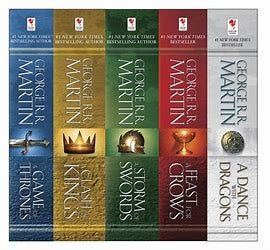Abandoned Series
A reply to Larry Correia's "Time To Get Over It And Move On"
Bestselling urban fantasy author Larry Correia wrote on his blog last week against how some fans have, in their anger at George R. R. Martin and Patrick Rothfuss for leaving their famous series abandoned for so long, resolved not to read any new series till they're finished. For the health of the fantasy genre, Correia argues, readers need to start reading unfinished series. Otherwise, lesser-known writers won't have the motivation to finish their series or the contracts to get them published if their first volumes don't get read.
He also links his older post on how authors don't owe their fans any future books in a series, because readers are only buying the one book, "not a lease or deposit on any future products," and "when you start bludgeoning them over the head about their unwritten moral obligations, you mess them up" psychologically.
I'm sort of one of the people Correia is talking to. For the last several years, I usually haven't started reading any new unfinished series. On the other hand, I've done that out of triage, because I have such a long reading list, so I might as well read the ones that're complete. Be that as it may, I have several thoughts on this.
To start with, while Correia's makes some very valid points, he's missing one other important matter: what does serialization across different novels do to a story as a story?
The thing about writing a first novel is that you then have a chance to write a second novel with everything you've learned in the meantime. Science fiction author Robert Heinlein clearly learned a lot between his first novel (Beyond This Horizon, 1942) and second (Rocket Ship Galileo, 1947), and again between that and his third (Space Cadet, 1948). Because they were all stand-alones, he could go back and build better settings and characters each time. When an author is writing a continuing saga though, he stays tied to whatever bad things he might've done in his first novel. Teenage fantasy author Christopher Paolini definitely improved between his first novel (Eragon) and the fourth in the series (Inheritance), and I could see him all-but-retconning in character growth and plot complications. But because the same storyline continued through all his four books, he needed to keep building on that fragile foundation of his first-ever novel and writing the plot arc he'd imagined then.
Pushing brand-new authors into writing series holds back the quality of their writing. Writers can improve between their first and second series, too. But, that takes a lot longer. In the extreme, as fan and amateur author Tom Simon put it, hardly any writer can take the lessons from their first complete ten-book series to write a second. Larry Correia himself has tried to get around this by writing multiple series at once - he has at least three in progress now, releasing books in each in turn - but still, he can't yet look back and learn lessons from any of them as a unit.
Alternatively, writers can plot their series loosely enough to leave room for improvements. At one extreme, we have Brian Jacques' Redwall, where each book is a completely separate plot linked by recurring locations and story elements and only occasionally characters. Less extreme, we have Dorothy Sayers' Lord Peter Wimsey series, where recurring characters (such as Lord Peter the detective) face different mysteries in each volume but develop their relationships with each other from book to book. This let her develop her craft and build the series appropriately. She could abandon the flawed parts of her first novel since she wasn't trying to continue any specific plot or story, while keeping and developing the characters and relationships she wanted to bring back in subsequent volumes.
But, many modern science fiction and fantasy writers aren't doing this. I've read intricately-plotted series by Jim Butcher, Orson Scott Card, Pierce Brown, Brandon Sanderson, and more. I haven't read Larry Correia himself, but I hear from my friends who have that his serieses are intricately plotted with connections between books, rather than each book standing alone like Redwall. This pattern holds authors back from improving their storytelling abilities, and puts the story at risk if the series never gets finished.
When a series is abandoned - either in so many words, or by letting it sit and grow moss in place as (to use Correia's examples) George R. R. Martin and Patrick Rothfuss have infamously been doing - the story is cut off. It's left incomplete, as incomplete as Dickens' famous Mystery of Edwin Drood. When Robert Jordan died before completing Wheel of Time, he left it to another author (who turned out to be Brandon Sanderson) to finish the series. That saved the story from being abandoned, and dramatically improved its quality.
If there's no Brandon Sanderson to finish an abandoned series, where would it have left that series' readers?
On the one hand, as Correia points out, readers have enjoyed the early parts of the series, what has been written and published. That's significant. A part of a story can be a beautiful thing in itself, as we know from when we've been midway through books. Were it otherwise, we could scarcely appreciate history, since the story of history is incomplete from our vantage point since it's still ongoing. We can still love the characters and reflect on their moments and arcs thus far.
On the other hand, a story is diminished by being incomplete. If Frodo was left midway on his quest without reaching Mount Doom, we would've missed so many riches of the story Tolkien was trying to tell - such as how he couldn't complete the Quest by himself, or who helped him, or how it forever changed him. The start of the story, by itself, would only be half as rich without the middle and end enriching it thanks to foreshadowing. Every good story is like this. This's the essence of a story. Every part of it serves some purpose, whether to forward the plot or build characters or enrich the world or some other good purpose or (ideally) more than one purpose at once. The different parts call ahead and back to each other to build on each other and make the entire story more than the sum of the parts.
In standalone novels, and episodic series like Redwall, we see this within each book; in partially-integrated series like Lord Peter Wimsey, we also see that to some extent between volumes with a limited amount of callbacks; in more fully-integrated series like Lord of the Rings or Wheel of Time, we see that across volumes to a greater extent.
Correia is correct that there's no actual contract for a sequel, and he might well be correct that fannish complaining doesn't motivate an author to produce. But he overstates his conclusion. If the author wants to produce a good story, he should complete his series. Fans are on some legitimate level expecting that, just like people who start a novel are expecting that it'll stay a novel rather than switch midway through (with plot unresolved) to become a cookbook, or people who start listening to a song are expecting it to resolve rather than stopping on an unstable chord. If I found a novel that did switch to a cookbook without resolving the story, I probably wouldn't read anything else by that author; if a lot of novels did that, I might be cautious reading in the genre. If the fans Correia is writing against are being just as cautious thanks to sagas that never complete their stories, I can't blame them.
So why are writers writing series and sometimes leaving them unfinished?
I completely believe everything Correia says about the state of the modern publishing industry. They pressure authors to leave hooks for sequels, they cut off authors midway through if the previous volumes sell poorly, and they don't care about everything I've been saying about story. It's a bad thing, but it is a thing. On top of this, the magazine market (where previous generations of new authors could publish short stories and serialize novels) has gone defunct or moved completely online, and myriads of new potential authors are querying a smaller and smaller number of publishers.
Online self-publishing has let some writers avoid the traditional publishing industry altogether, but that introduces new huge problems in getting an audience. Correia himself self-published his first novel after repeated rejections by traditional publishers, but he only managed to get sales (and get his future books picked up by a publisher) because he already was well-known in other circles.
So, I can totally understand why an author might decide to give into these market forces, start a long saga, and then perhaps abandon it. Correia has very practical points here. But still, he's forgetting to consider what stretching a story across so many volumes (and maybe abandoning it) will do to the quality of the story.

I can see why Correia's writing this. New authors are in a tough situation in so many ways already, and this's just adding one more way. I don't have a solution for them. I don't have any personal experience either - I've tried my hand at writing, but my novels are half-finished and in no state to even think of publishing.
But I am a reader, and I know something of the art of story. So, I can speak from that perspective, and say that the solution - whatever it is - can't forget that. Readers, on a very real level, will see that as well and look for good stories. So, writers should (inasmuch as possible) tell good stories - which means complete stories.



